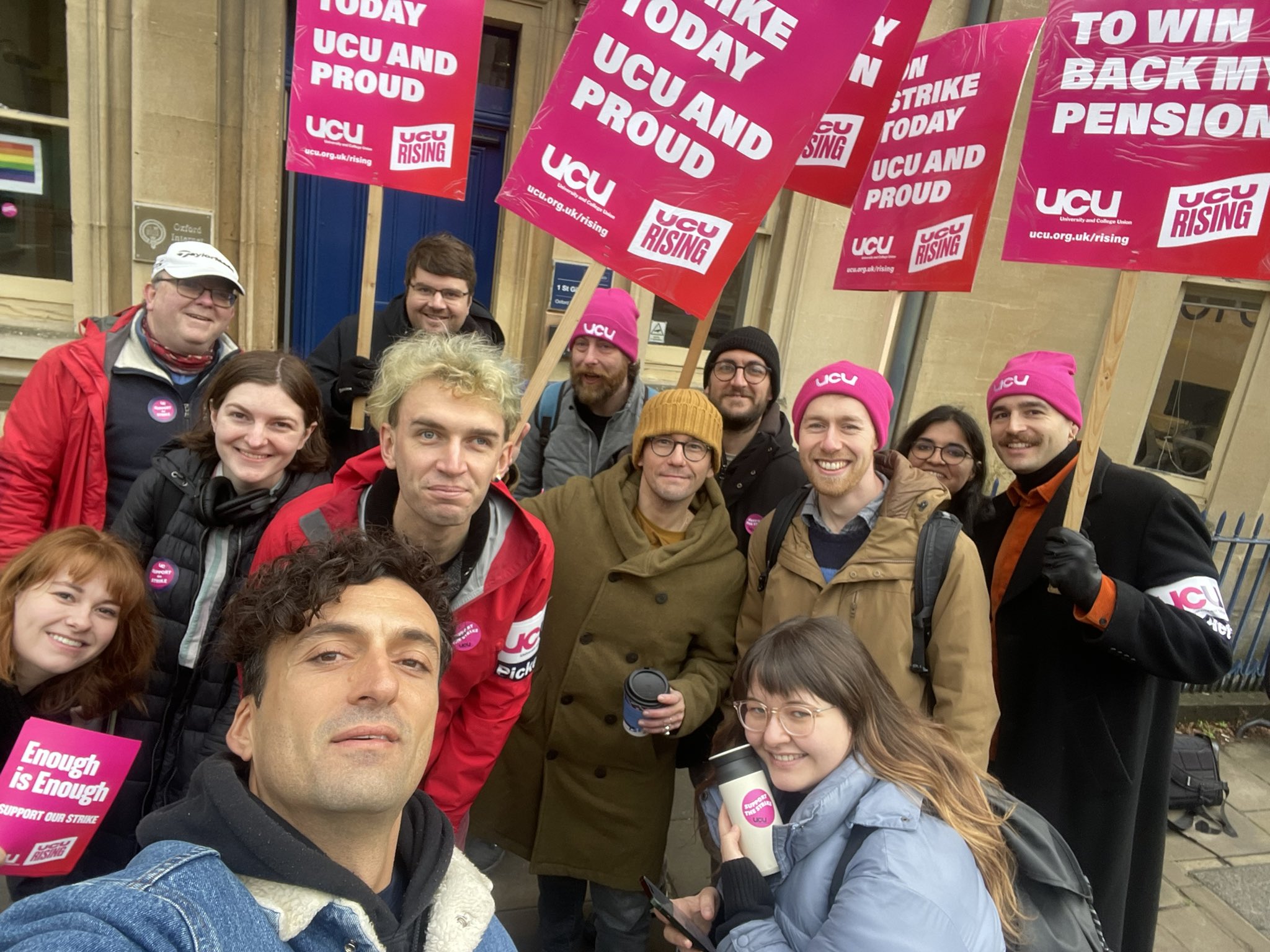Picket lines were mounted outside schools, universities and Royal Mail centres on Thursday as tens of thousands of workers went on strike in worsening disputes over pay, jobs and conditions.
Union leaders said walkouts were being solidly supported amid a bitter war of words in the industrial unrest sweeping the country.
The general secretary of the Communication Workers Union (CWU) accused Royal Mail of subjecting its workers to a “psychological attack”.
Speaking at a picket in Camden, north London, Dave Ward told the PA news agency: “What they’re doing is threatening our people every day. If they leave behind mail because they can’t complete it in their normal work time, they’re being threatened with the sack.
“They’re been pushed around to this delivery, that delivery, they’re being refused overtime when there’s mail in the office. They won’t pay out overtime for our people.
“They’d rather have the quality of service failures and then they blame it on the postal workers.

“And genuinely, we’ve seen people resigning from the job because they’re sick and tired of the attacks that are going on in work.
“It’s a psychological attack.”
The union has rejected the company’s “final” offer and is pressing ahead with a series of strikes in the coming weeks, including on tomorrow’s Black Friday and on Christmas Eve.
Around 70,000 members of the University and College Union (UCU) will strike on Thursday and Friday, and again on November 30, in a dispute over pay, pensions and contracts.
It will be the biggest strike of its kind, affecting an estimated 2.5 million students, with the union warning of escalated action in the new year if the row is not resolved.
Dr Graeme Millen, 32, who lives in Glasgow and is a Scottish early modern historian at the University of St Andrews, told the PA news agency that it was the first time he had been on strike and one of the main reasons behind his decision was because of the “shortcomings of insecure contracts and low pay”, which has made it difficult for working-class people like him in the profession.
“Basically you’re unable to sustain yourself in that sector unless you have a generational wealth”, he said.
“My department’s one of the top in the UK but that sort of performance comes from people like me who’ve worked on the ground level and the universities are not commensurately paying us for the work that we’re doing.
“Which is also why we’re engaging in actions short of a strike, basically because for the most part, this sector is run on goodwill, and people working out of contract.”
He added that he has seen so many colleagues get “tired, broken up and just decide to stop and we’re losing talent, we’re losing people from this sector”.
“There are far better researchers than me that are leaving because they cannot sustain this without generational wealth.
“I would not take strike action if I feel it could be avoided, but I feel like we’re at a breaking point. I’m looking at leaving the sector next year because I don’t think I can sustain it.”
Mark Graham, 42, a Professor of Internet Geography at the University of Oxford, also decided to strike because he has witnessed the “erosion” of the pay, pensions and working conditions of academics for years.

“Our employers don’t seem to care. The University sector is generating record incomes, and vice-chancellors take home enormous pay packets”, he told PA.
“But the rest of us are left out to dry. We are faced with an enormous real-terms pay cut, and a series of cuts to our pensions that means an average member loses a third of their retirement income. Enough is enough.”
He added that the atmosphere on the picket line in Oxford he was at, which “many hundreds” also came to, was “vibrant”, with lots of music, speeches and dancing, but also “lots of anger that our bosses have forced this upon us”.
“We want to be back inside, in the classroom, with our students.
“Our working conditions are [students’] learning conditions.
“What sort of education will faculty really be providing if we continue down this low-paid, precarious route.”
The union says lecturers and other academic staff have suffered a decade of below-inflation pay rises, with a 3% increase announced in the summer.
RT THE HELL OUT OF THIS 🔥
Inch by inch.
Member by member.
University by university.
Tomorrow we rise.#ucuRISING pic.twitter.com/bxfQVgCbdF
— UCU (@ucu) November 23, 2022
UCU general secretary Jo Grady joined a picket line in Manchester, telling PA that UCU members have “had enough” of falling pay, pension cuts and gig economy working conditions.
“Our members are absolutely up for this strike in huge numbers because they know what is at stake.
“Universities have £40 billion in reserves but appear to be more bothered about buildings than people.

“Around 90,000 staff are on fixed terms contracts. They want a career but are being prevented from putting down roots.”
Schoolchildren stayed at home as teachers across Scotland walked out in their first national pay strike in almost 40 years.
Every school on the Scottish mainland will be shut as thousands of teachers in the Educational Institute of Scotland (EIS) walked out over pay.

Education Secretary Shirley-Anne Somerville warned the Scottish Government’s budget is under “extreme pressure” and the 10% rise demanded is “unaffordable” after a last-ditch offer was made in a bid to avert the strike.
Raj Jethwa, chief executive of the Universities and Colleges Employers Association (UCEA), said: “Despite the initial feedback from higher education (HE) institutions suggesting low and isolated impact on students, it is saddening if even a single student misses out on a lecture because of industrial action, especially when UCEA is consulting on an early start to the 2023-24 pay negotiations to address cost-of-living concerns.
“Strike action will do nothing to support students, staff or the many HE institutions working hard to avoid redundancies or maintain staffing levels.
“Our member institutions delivered the August pay uplift despite unprecedented financial challenges.

“Although likely to be limited with such a small percentage of staff voting in favour, HE institutions are fully prepared to address the impact of this industrial action.
“Institutions are proving that they have effective mitigations in place to minimise any interruption of learning or services to students and staff. HE institutions are particularly disappointed that UCU is encouraging its members to target students who have endured so many recent disruptions.
“While these early reports are of low levels of disruption to teaching it does, of course, take time for these large institutions to find out exactly how many scheduled classes have not taken place on a given day, not least as UCU is actively encouraging staff not to declare they intend to take action.
“We respect employees’ right to take lawful industrial action, but it is misleading to their members for UCU to ask them to lose pay in pursuit of an unrealistic 13.6% pay demand which would cost institutions in the region of £1.5 billion.
“UCU leaders must provide its members with a realistic and fair assessment of what is achievable because strike action does not create new sector money.“


